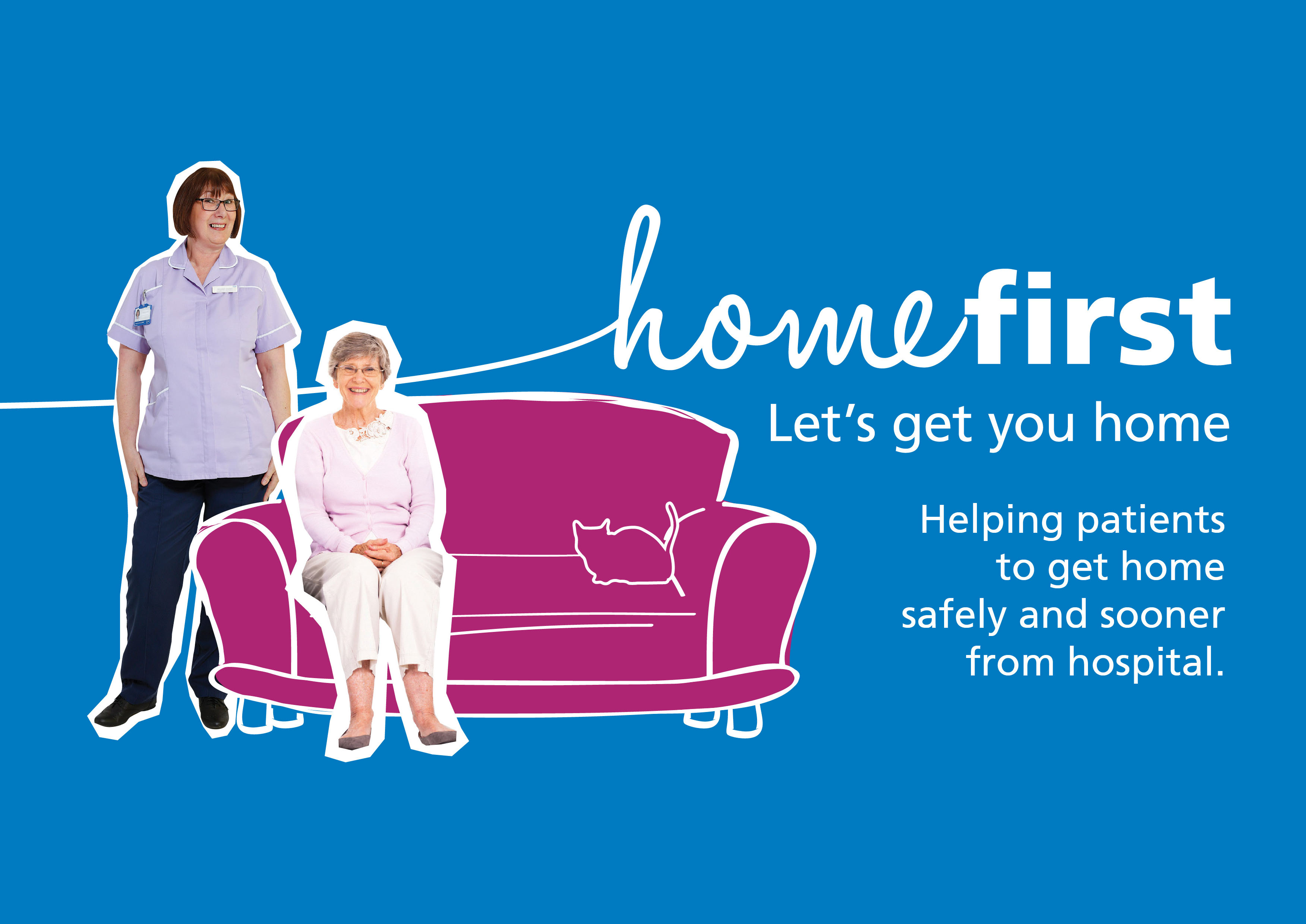
Hundreds of patients in west Kent are now receiving care at home who would normally have stayed in hospital, thanks to Home First.
The new approach aims to make sure every patient who no longer needs hospital care, but still needs support, can continue their recovery safely at home.
Under Home First, hospital staff work closely with colleagues in the community and in social care to plan for a patient to return home from the first day they arrive.
On discharge, Home First teams are triggered into action to make sure the right support is in place. Patients are met at home within hours and during the next couple of days are assessed by a Home First Team, made up of community nurses, therapists and social care professionals. Every patient has a plan for them and this may include therapy, goals, support for carers, any equipment they may need and self-help advice.
For patients who are unable to manage at home, short-term rehabilitation is provided in a community hospital. For example, in west Kent, patients are rehabilitated in an eight-bed therapy ward at Tonbridge Cottage Hospital.
Lesley Strong, Kent Community Health NHS Foundation Trust’s Chief Operating Officer, said: “When you are really sick, hospital is the best place you can be, but once you no longer need hospital care, you recover much faster at home.
“The longer someone spends in a hospital bed, the more muscle they lose and the weaker they can become – which makes it harder for them to regain their independence. So, as soon as they no longer need hospital care, we want to get them home.
“For patients who need short-term support, we know that assessing them in their own environment is best to see how they are coping and what extra support they might need.
“This could mean anything from physiotherapy, arranging grab rails and commodes to designing activities to help enhance their independence and get back to doing what they love.”
Home First relies on Kent Community Health NHS Foundation Trust, Maidstone and Tunbridge Wells NHS Trust and Kent County Council working closely together, as well as involving our voluntary and community sector partners more effectively.
As well as being better for patients to recover, the scheme is just one way the NHS and social care is working together to make sure the hospitals bed are used by people who really need them.
Angela Gallagher, Chief Operating Officer at Maidstone and Tunbridge Wells NHS Trust, said: “We know that leaving hospital can sometimes be unsettling, but most people want to get home to family, friends and loved ones as soon as possible – and this is better for their recovery.
“The scheme is providing people with more support to leave hospital than ever before and means our hospitals are free to treat the sickest people who need us most in the right place at the right time.”
For patients who are unable to manage at home, short-term rehabilitation is provided in a community hospital or care home where an assessment is done. The patient and their family, together with the team supporting them, can then come to a decision about their future, which could mean moving them to longer-term residential care.
Janice Duff, Kent County Council’s Assistant Director for Older People and Physical Disability, said: “We have increased the support available from social care and are working closely with our colleagues in health to provide a seamless approach to getting people home and supporting them back to independence.
“We are really excited about the improvements we are making and hope this will not only benefit patients and carers but everyone working hard to support them.”
Case study
Evelyn gets back home to her ‘Mr Perfect’
Separated from her ‘Mr Perfect’ after nearly than 60 years of marriage, Evelyn Lawrence was desperate to be back home from hospital.
The 82-year-old, from Tonbridge, slipped and cracked her hip while shopping in Sainsbury’s with her husband Gordon in October. Childhood sweethearts, the couple have barely spent a night apart since they met as teenagers.
Evelyn said: “Gordon had the trolley and I went off to get some eggs and rolls, which I had balanced on each other. I peeked round a corner to see where he was and I slipped. My instinct was to save the eggs and rolls, which I should have just thrown on the floor!”
The grandmother had cracked her hip, which she describes as “excruciating and more painful than childbirth”. She had to stay awake while surgeons at Tunbridge Wells Hospital in Pembury performed a dynamic hip screw.
As they had to cut through muscle to repair Evelyn’s hip, two weeks after the operation she was transferred to Tonbridge Cottage Hospital for intensive physiotherapy to build up her strength and learn to walk again, so she was safe to go home. For patients who are unable to manage at home, short-term rehabilitation is provided through Home First in a community hospital or care home where an assessment is done.
She said: “As soon as I stepped over the threshold at Tonbridge Cottage Hospital, it was like being enveloped in a warm blanket with so much kindness and compassion – and the best cheese and tomato sandwiches.
“They worked hard on me. I am a very diligent patient and I did everything they told me – because I was helping them, to help me get better.
“To help me at home, I was given a trolley on wheels, a handy bit of kit to help raise the toilet, a Zimmer frame and walking sticks.”
Thanks to intensive physio, Evelyn was home with 24 hours to spare before she jetted off on the cruise of a lifetime with her family.
ENDS
Or watch:
